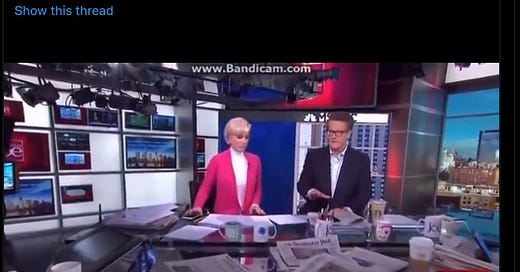The War for Eyeballs
Or: Twitter Governance and the Curve Wars. What happens when a platforms controls a resource much more valuable than the profits it can generate from that resource?
Social media platforms like Twitter/FB are valuable because ownership of platforms is ownership of people’s eyeball time. Eyeball time is very valuable! Advertisers pay like $1 per click for eyeball time on Google. Who might want to buy eyeball time? You might be politically motivated, and want to do something like this. More selfishly you might just sell a bunch of stuff and want to direct eyeball time towards stuff you sell.
An interesting feature of social media platforms is that, while they seem to print money, they in fact likely extract a very small amount of profits from ad sales, relative to the total value of eyeball time they control. Facebook and Twitter make a lot of money off ads. But Facebook and Twitter have the power to basically destroy democracy at will! The value of democracy in the US is presumably much larger and all they try to do at regular times is sell some ads and try to stay out of regulatory struggle.
Governance rights over social media platforms are interesting because control of Twitter in a sense grants control over the giant pot of valuable rents which is the eyeball time Twitter controls. There is a "front door" to buying eyeball space, which is to do business with Twitter, through ads, promoted tweets, etc. There is also theoretically a backdoor: buy out the entire platform, and then rather than buy ad space, you can just tweak the feed ranking algorithm to redirect eyeballs however you want. If you are small, this of course does not make sense. If you are sufficiently big the back door may be much cheaper than the front door as a way to buy eyeballs!
Considering Twitter as an individual profit-maximizing firm, if you buy Twitter and redirect eyeballs to your preferred target, you will likely lose money, since your tweaks to the feed ranking algorithm likely decrease engagement somewhat and thus decrease ad revenue. But if your goal is, for example, to destroy democracy in the US, or push some other kind of political agenda, you may be willing to sacrifice a lot of revenues on Twitter to do this.
There is thus an interesting analogy between control rights for Twitter and other social media platforms, and the recent “Curve wars” in web3. Eyeball space in social media is like liquidity in web3: everyone values it and everyone wants to control it. Curve is thus similar to Twitter, in the sense that it controls a resource — incentivized liquidity provision — which is more valuable than the profits CRV extracts from providing the resource. As a result, many parties find it in their interest to buy control rights over CRV/CVX, and run it in a purposefully non-profit-maximizing way. In web3, large protocols amass piles of CRV/CVS governance tokens, to redirect liquidity towards their own tokens. Again, the fundamental principle behind the Curve wars is that the liquidity that Curve controls is much more valuable to some market participants, than the potential profits Curve generates using that liquidity.
My thesis is thus that Twitter and similar platforms are, in some sense, doomed to exist in perpetual governance conflicts similar to the Curve wars. Market forces will not allow Twitter and similar companies to exist as independent, reasonably objective, profit-maximizing company. Since the eyeball time rents that Twitter controls are vastly larger than the profits it generates from those rents, Twitter is essentially doomed to be locked in a endless governance war. Interested forces will fight endlessly for control over Twitter, to run Twitter in a purposefully non-profit-maximizing way, to channel eyeballs towards one’s desired objective. Parties which value eyeball time for various reasons will endlessly struggle for control over Twitter, not for its ad profits, but to funnel eyeball time, in a purposefully non-profit-maximizing way, towards causes that they value.
Regulation has the potential to improve this outcome somewhat. If regulators essentially controlled Twitter, forcing market participants to run Twitter in a nominally unbiased way (to be defined by regulators), we could potentially avoid the outcome where Twitter’s eyeballs are endlessly fought over in takeover battles. Of course, regulators and governments themselves would have incentives to use their control over Twitter’s eyeball space in non-profit-maximizing ways. Whether one believes this is good or bad for society depends on one’s views of the role of government in society.
What would happen, if, as some are saying, we eventually moved to a universe where Twitter existed beyond regulation? If we all used a decentralized web3 version of Twitter, with the feed ranking algorithm controlled through token governance voting? In such a world, the “war for eyeballs” could be much, much worse. Regulators would have a much harder time actually intervening in the market for eyeballs. Control over eyeball time would be left entirely at the whims of market forces.
If you thought the “market for eyeballs” in web2 advertising, and the Curve Wars, were each dystopian individually, we are in for a whole lot of fun when the two forces inevitably combine.



